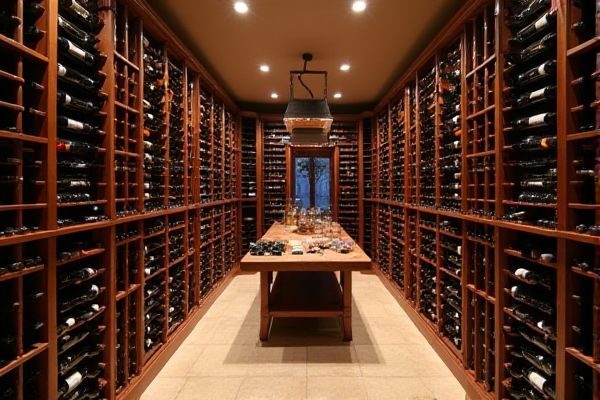
Compact wine storage solutions offer space-saving convenience and affordability, making them ideal for casual wine enthusiasts or those with limited space. Exploring the benefits and drawbacks of both options will help you determine whether a dedicated wine cellar or compact storage best suits your wine collection needs--read on to discover the perfect fit for your home.
Table of Comparison
| Feature | Compact Wine Storage | Dedicated Wine Cellar |
|---|---|---|
| Capacity | 10-50 bottles | 100+ bottles |
| Temperature Control | Basic or none | Precise, adjustable |
| Humidity Control | Limited or none | Optimized (50-70% humidity) |
| Space Requirement | Small footprint, portable | Dedicated room or space |
| Cost | Affordable ($100-$1000) | Expensive ($5,000+) |
| Storage Environment | Stored in mini-fridges or racks | Climate-controlled, dark, vibration-free |
| Ideal For | Casual collectors, small collections | Serious collectors, long-term aging |
| Installation | Plug and play | Professional setup required |
Introduction to Wine Storage Solutions
Compact wine storage offers a space-efficient way to store wine collections with temperature control, ideal for casual enthusiasts or smaller spaces. Dedicated wine cellars provide optimal aging conditions with precise humidity and temperature regulation, making them perfect for serious collectors or extensive collections. Your choice should align with storage capacity needs, climate control preferences, and budget considerations for preserving wine quality.
What is Compact Wine Storage?
Compact wine storage refers to space-efficient units designed to store a limited number of bottles while maintaining optimal temperature and humidity conditions for wine preservation. These units are ideal for casual collectors or small households, offering features such as adjustable shelves, UV protection, and vibration reduction to ensure wine quality. In contrast, a dedicated wine cellar provides larger capacity and custom climate control, suited for serious collectors requiring long-term aging and extensive collections.
Understanding Dedicated Wine Cellars
Dedicated wine cellars provide precise temperature and humidity control essential for long-term wine preservation, surpassing compact wine storage options in stability and capacity. These cellars utilize advanced cooling systems and insulation materials to maintain optimal conditions, preventing oxidation and spoilage. Ideal for serious collectors, dedicated wine cellars ensure consistent aging environments that enhance wine quality and value over time.
Space Efficiency: Compact vs Cellar
Compact wine storage maximizes space efficiency by fitting into small areas such as closets or under counters, making it ideal for apartments or limited spaces. Dedicated wine cellars require significantly more room, often a separate climate-controlled room, which is better suited for extensive collections and long-term aging. The choice between compact storage and a cellar depends on collection size and available space, balancing convenience with storage capacity.
Temperature and Humidity Control Comparison
Compact wine storage units offer basic temperature and humidity control suitable for short-term wine preservation, often maintaining temperatures between 50-64degF with moderate humidity levels. Dedicated wine cellars provide advanced, customizable climate control systems that maintain ideal conditions around 55degF and humidity levels of 60-70%, essential for long-term aging and preventing cork deterioration. Your choice depends on whether precise environmental stability is crucial for your wine collection's longevity or occasional consumption.
Cost Analysis: Compact Storage vs Wine Cellar
Compact wine storage offers a cost-effective solution for Your wine collection with lower initial investment and minimal maintenance expenses compared to a dedicated wine cellar. Wine cellars require significant upfront costs for construction, climate control systems, and insulation to preserve optimal aging conditions. Over time, compact storage systems provide budget-friendly flexibility without compromising the quality of wine preservation.
Wine Aging Potential and Quality Preservation
Compact wine storage units maintain consistent temperature and humidity levels essential for slowing oxidation and preserving wine quality, making them suitable for short to medium-term aging. Dedicated wine cellars provide superior environmental control, including stable temperatures around 55degF (13degC) and humidity near 70%, creating optimal conditions for long-term aging and enhancing flavor complexity. The structural insulation and vibration reduction in dedicated cellars prevent premature aging, ensuring wines develop their full aging potential and maintain peak quality over decades.
Design and Aesthetic Considerations
Compact wine storage units offer sleek, space-saving designs with modern finishes that blend seamlessly into contemporary interiors, making them ideal for small apartments or minimalistic homes. Dedicated wine cellars provide customizable design options with traditional materials like wood and stone, creating a luxurious ambiance that enhances the visual appeal of extensive collections. Both options prioritize temperature control and display aesthetics, but dedicated wine cellars deliver a more immersive and elegant wine storage experience.
Installation and Maintenance Requirements
Compact wine storage units require minimal installation, often needing only a power outlet and proper ventilation, making them ideal for small spaces or renters. Dedicated wine cellars demand professional construction, including climate control systems and humidity regulation, resulting in higher installation costs and more complex maintenance. While compact units offer easy upkeep, dedicated cellars require regular monitoring to maintain optimal temperature and humidity for wine preservation.
Choosing the Right Wine Storage for Your Needs
Compact wine storage units offer flexible, space-saving solutions ideal for casual collectors or limited space environments, maintaining optimal temperature and humidity for short-term preservation. Dedicated wine cellars provide advanced climate control, larger capacity, and aging conditions suitable for serious enthusiasts or long-term storage of valuable collections. Assessing collection size, storage environment, and budget helps determine the most appropriate choice between compact units and fully customized wine cellars.
 homyna.com
homyna.com